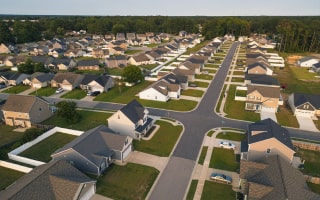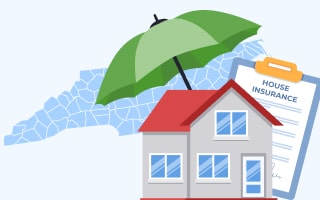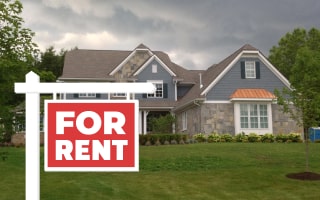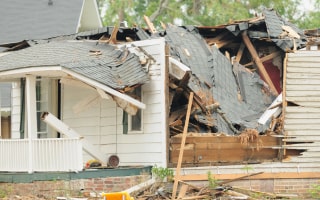Homeowners Insurance in North Carolina

North Carolina is known for its smoky mountains, rich cultural history, and miles of coastline. Located in the southeast, it is prone to a wide variety of natural disasters that destroy property and produce claims and homeowners insurance losses. Some of the wild weather in North Carolina includes tornadoes, landslides, earthquakes, floods, and hurricanes. Since 1953, North Carolina has had 59 federally declared disasters, and the rate of disasters per 1 million people is 5.38.
Along with abundant claims for hurricanes and severe weather, North Carolina residents also file insurance claims for water damage and flooding, fire and lightning, theft, general property damage, vandalism, personal liability, and dog bites.
Homeowners have no federal or state requirement to purchase or keep insurance on their homes. However, if you purchase a home and need a mortgage, your bank will require you to buy home insurance and keep coverage active until you pay off the loan. They will also dictate the coverage levels, which may be more than you would choose for yourself.
As of September 2024, the national average for homeowners insurance is $2,728 per year or $227 monthly. Homeowners in North Carolina pay an average of $2,066 per year, which is slightly less than the national average.
Types of Homeowner Insurance Coverage Available in North Carolina
Homeowners insurance providers in each U.S. state decide which types of coverage to offer property owners based on the inherent perils of the location. In North Carolina, the available types of coverage include:
-
Dwelling: Dwelling coverage protects the structure of your home. It pays to replace or repair your home after a covered event. Some of the things dwelling coverage rebuilds are the walls, roof, foundation, etc.
-
Other Structures: This coverage pays to replace detached items on your property, such as fences, garages, sheds, pools, hot tubs, and fountains.
-
Liability: Liability coverage protects you legally. After someone gets hurt on your property due to your negligence and sues you, it pays your legal bills up to a specific limit.
-
Medical Payments: If someone gets injured on your property, this insurance will pay their medical bills.
-
Personal Property: Personal property is a crucial section of your insurance policy. It pays to replace your personal belongings after they are stolen or destroyed due to a covered peril.
-
Additional Living Expenses (ALE): Whenever you are forced to leave your home while it is repaired or rebuilt due to a qualifying event, ALE insurance pays for your living expenses (food, lodging, laundry, pet boarding, etc.).
Floods can also be a concern in North Carolina. FEMA (Federal Emergency Management Agency) manages the National Flood Insurance Program (NFIP) through a network of 50 providers across the U.S. Since most homeowners insurance does not cover floods, this supplemental coverage can repair damage and replace items after a flood. Depending on the options you choose, it can cover the building and/or your personal belongings. This program is available to homeowners, renters, and businesses. Learn more about the program on FEMA's website.
Home Insurance and Natural Disasters
There has been a significant uptick in natural disasters and severe weather over the past few years, which has caused a ripple effect within the homeowners insurance industry. Climate change is the primary factor affecting home insurance rates today, which are steadily climbing across the U.S. The average rate of increase over the past five years is 34%, and in some turbulent weather areas, rates have increased by as much as 60%. Rates in North Carolina rose 36.5% over the past five years, which is slightly more than the national average.
Along with flooding, North Carolina experiences tornadoes, landslides, earthquakes, and hurricanes. Just one fire and lightning damage claim costs insurers an average of $77,340. Water and freezing damage cost an average of $11,650, and wind and hail costs an average of $11,695 per incident. From 2015 to 2019, homeowners insurance providers lost $1,467,062,200. North Carolina also made the list of states with the highest number of lightning claims for 2021, costing $36,800,000. The state is also on the list for the state with the most potential for damage from hurricanes and most hail claims, with a total of 58,342. From 1980 to 2024, North Carolina had 117 billion-dollar disasters. In 2023, North Carolina had 14 tornadoes, and in 2022, the state had a shocking 6,222 wildfires, destroying 28,851 acres of land, ranking them #3 on the list of most wildfires and acres destroyed.
How Can I Save on Homeowner Insurance Premiums in North Carolina?
North Carolina residents know the impact of rising home insurance costs. As rates increase, homeowners are desperate to find ways to reduce that expense. The best way is first to understand what impacts home insurance costs then adjust from there. Those factors include:
-
Location: Your location matters the most. If you live in an area like North Carolina with a lot of wild weather or a city with a high crime rate, you will pay much more than if you live in a safe area with mild weather.
-
The Size and Condition of Your Home: Larger homes cost more to rebuild and insure, while well-maintained homes cost less.
-
The Age of Your Home: The age also matters. The older your home, the higher your premiums will be. Newer homes cost a lot less.
-
Your Credit Score: People with good credit will earn lower rates than those with poor credit.
-
Claims History: Anyone who files many small claims will pay more for homeowners insurance than those with a clean claims history.
-
Levels of Coverage: The more coverage your buy, the higher your premiums will be.
-
Owned or Financed: If you own your home, you get to choose the coverage levels. If you financed it, your lender will choose for you.
-
Your Deductible: The higher your deductible, the lower your rates will be. Conversely, the lower the deductible, the higher your rates.
-
Risks: The more risks (like a pool, trampoline, or tree house) you have on your property, the higher your rates will be.
-
Materials Cost: The materials that went into building your house also matter. If you used expensive, high-end roofing and siding, your premiums will be higher than if you used standard materials.
Some ways to save on your homeowners insurance in North Carolina are:
- Avoid Adding Risks: Even if your family clamors for a pool, only install one if you are okay with paying higher insurance bills.
- Bundle Your Insurance: Bundle your insurance policies with the same carrier to get a discount on your insurance.
- Ask for Discounts: Ask your agent for any available discounts.
- Shop Around: Get multiple quotes before choosing an insurance provider.
- Raise Your Deductible: Raise your deductible as much as possible to pay less for your home insurance.
- Security/Safety Upgrades: Install a security system or add fire safety features to your home, and your agent will lower your rates.
- Remain Loyal: Stay with the same insurance provider for many years; they should lower your rates over time.
- Rethink Small Claims: Don't file any small claims. Fix the issue yourself and wait to use your insurance until you really need it.
Home Insurance Discounts in North Carolina
Home insurance works like other insurance policies; you purchase it to protect your home in the event of a disaster. You select your coverage and pay monthly premiums. Then, after a qualifying event, the insurance company will pay to repair or replace your home. Some common covered perils are fallen trees, wind damage (due to storms), ice, lightning, snow, smoke, fire, theft, and vandalism. Most policies also include coverage for other structures, personal property protection, liability, medical payments, and ALE insurance.
You can quickly get a new policy by researching brands, finding a provider you want to work with, calling them on their 800 number, or applying online. You could also find a local agent to work with and let them help you determine the best options for your situation.
Some of the most common discounts offered by reputable home insurance providers include:
- Military Discount: Many firms offer military members (active and retired) a discount on home insurance.
- Non-smoker Discount: Non-smokers automatically get a lower fire risk discount.
- Senior Citizen Discount: Some insurers discount senior citizens of a certain age.
- Occupational Discount: People who work for the government, as teachers, or as firefighters often get discounts for their occupations.
- Bundling Discount: When you bundle multiple policies with an insurance provider, they discount your premiums.
- Claims-Free Discount: Remain claims-free for as long as possible and earn a discount with your provider.
- Paperless Discount: Go paperless, help save the environment, and get a small discount.
- Autopay Discount: Your carrier will discount your bill when you sign up for autopayments (withdrawn from your bank account each month).
- Security Discount: Install home security to keep your home safer and earn a discount.
- Fire-Safety Discount: Install fire extinguishers, smoke alarms, and sprinklers to earn a discount on your premiums.
- Smart-Home Discount: Smart home devices can help monitor your home and avoid disaster, and your provider will reward you with a discount.
- New-Home Discount: New homes cost much less to insure than older ones.
- Location Discount: Some safe locations also earn a discount on home insurance.
Common Rates Offer by Homeowners Insurance Firms
New homes cost a lot less to insure than older homes. In many cases, new construction homeowners will pay up to 40% less, and for houses five years old or younger, as much as 25% less. Your actual rates will vary based on your age, credit score, insurance firm, claims history, and other factors. In North Carolina, people with new homes pay an average of $1,500 a year.
Top 10 Home Insurance Firms in North Carolina and Average New Home Savings
| Company | % savings |
|---|---|
| Nationwide | 76% |
| State Farm | 51% |
| Allstate | 47% |
| Travelers | 63% |
| Erie | 51% |
| Auto-Owners Insurance | N/A |
| USAA | 54% |
| Liberty Mutual | N/A |
| Amica Mutual Insurance | N/A |
| American Family Insurance | 55% |
Home Insurance and Renovations in North Carolina

Home renovations beautify and renew your home, making it more livable and attractive. However, they can also significantly impact your home insurance rates. Some updates enlarge your home, making it more valuable, while others add risk, both of which will increase your rates. Other upgrades may enhance the safety or security of your home, lowering your rates. Still, some renovations have no effect at all or cancel each other out.
![]() Home Renovations that Increase Rates
Home Renovations that Increase Rates
Some home renovations that increase your rates include:
- New Fireplace: Nothing beats a fire on a cold winter's night, but adding a fireplace to your home will drastically increase your fire risk and your home insurance premiums.
- Building a Tree House: Kids love treehouses, but remember that building one will increase your home insurance rates.
- Adding a Hot Tub: Relaxing in a hot tub after a long day is ideal, but your increased premiums may not be.
![]() Home Renovations that Decrease Rates
Home Renovations that Decrease Rates
Some home renovations that decrease your rates include:
- New Roof: Adding a new weather-resistant roof will help keep your home safer and, as a result, lower your risk of claims and your rates.
- Fire-Safety Upgrades: Installing fire safety devices such as sprinklers, smoke alarms, and fire extinguishers will drastically decrease your fire risk and reduce your rates.
- Upgraded Plumbing: Old plumbing can leak and burst pipes, causing severe water damage. Upgrading your plumbing can eliminate these issues and help to decrease your home insurance costs.
If you replace your siding, it could reduce your rates because your home will be more weather-resistant unless you use expensive materials, and then it may add to them or cancel out any savings.
When you decide to update your kitchens or baths or replace appliances or flooring, homeowners insurance does not cover those things. Your home insurance only pays to repair or replace the home after a qualifying event. Some other things not covered by homeowners insurance are pest infestations, rodents, and animal damage.
Before embarking on renovation projects, you should always discuss them with your agent. They can help you understand their impact on your coverage and rates. You may need to adjust things after the renovation.
North Carolina Renters' Insurance

Anyone who rents an apartment, condo, or house should also have a type of homeowners insurance. Renters insurance is specifically for renters and does not include any dwelling coverage. The property owner must handle that. Its primary purpose is to protect your personal property and replace your belongings after a covered peril like smoke, fire, vandalism, windstorm, or theft. Most renters policies also include liability, medical payments, and loss of use coverage.
Some of the things covered by renters insurance include:
-
Small Appliances
-
Furniture
-
Clothing
-
Bedding
-
Bath Items
-
Sports Equipment
-
Electronics
Renters insurance is priced according to three main principles:
-
Location: Even as a renter, your location matters. If you live in the city, you will pay more than if you live in the country. If your area has many weather events, you will pay higher rates.
-
Coverage Limits: The more coverage you buy, the higher your premiums.
-
Number of Units in the Building: The more units in your building, the lower your rates.
The national average for renters insurance is $15-$20 monthly. In North Carolina, renters pay an average of $14/month or $162 a year, which is directly in line with the national average.
Condo Insurance in North Carolina

Condo insurance is a type of homeowners insurance for condo owners but with a slight difference. Each condo association has its own master insurance policy covering the dwelling portion, which will pay to replace each building and restore it to its original (when first built) condition. The issue is that condo owners have long since upgraded their kitchens, baths, flooring, appliances, and fixtures. Condo insurance includes a dwelling portion but only applies to the condo's interior. This is referred to as "walls-in" coverage. This insurance will pay to bring it back to its most current condition. Condo insurance also includes liability protection, medical payments, personal property coverage, loss of use, and loss assessment coverage.
The difference between condo and renters insurance is that renters insurance has no dwelling coverage, while condo insurance does, but it is limited to the interior only. Plus, the liability portion only applies to people who are injured inside the condo, not on common grounds.
Some things covered by condo insurance include:
- Appliances
- Interior Walls
- Flooring
- Wiring
- Plumbing
- Cabinets
- Countertops
- Furniture
- Light Fixtures
- All Personal Belongings
The average rate for condo insurance in North Carolina is $55/month or $660 a year. The national average is $625/year for $60,000 personal property coverage, $300,000 liability protection, and a $1,000 deductible.
Some ways to save on condo insurance include:
- Raise Your Deductible
- Improve Your Credit
- Don't File Small Claims
- Make Safety/Security Upgrades
- Shop Around
- Bundle Your Policies
- Ask for Discounts
- Remain Loyal to the Same Carrier
North Carolina Home Insurance Market
The state of the homeowners insurance industry is dire, with substantial losses incurring year over year in most of the country. However, despite seven billion-dollar disasters in North Carolina, insurance providers within the state have been profitable most of the years during the past decade, including 2023. This will likely change as global warming continues to affect weather patterns, causing more frequent storms.
North Carolina experiences some of the worst weather events possible, including tornadoes, landslides, earthquakes, hurricanes, and floods. These are costly and damaging disasters, and if they continue to ramp up, insurers in the state will likely have to limit coverage and cancel some high-risk customers.
The federal government does not regulate the home insurance industry. That is left up to each state, which designates a specific department to handle customer complaints, monitor providers and rates, and sanction guilty firms. In North Carolina, that agency is the North Carolina Department of Insurance located at Dobbs Building: 430 N. Salisbury Street, Raleigh, NC 27603-5926.
Homeowners Insurance Guide
- Homeowners Insurance in North Carolina
- Types of Homeowner Insurance Coverage Available in North Carolina
- Home Insurance and Natural Disasters
- How Can I Save on Homeowner Insurance Premiums in North Carolina?
- Home Insurance Discounts in North Carolina
- Home Insurance and Renovations in North Carolina
- North Carolina Renters' Insurance
- Condo Insurance in North Carolina
- North Carolina Home Insurance Market
Instant Access to North Carolina Property Records
- Owner(s)
- Deed Records
- Loans & Liens
- Values
- Taxes
- Building Permits
- Purchase History
- Property Details
- And More!
Homeowners Insurance Guide
- Homeowners Insurance in North Carolina
- Types of Homeowner Insurance Coverage Available in North Carolina
- Home Insurance and Natural Disasters
- How Can I Save on Homeowner Insurance Premiums in North Carolina?
- Home Insurance Discounts in North Carolina
- Home Insurance and Renovations in North Carolina
- North Carolina Renters' Insurance
- Condo Insurance in North Carolina
- North Carolina Home Insurance Market